- Home
- S. J. Parris
Giordano Bruno 03 - Sacrilege Page 6
Giordano Bruno 03 - Sacrilege Read online
Page 6
Walsingham scanned my face with his practised gaze, as if for any twitch of a nerve that might betray a lie. My throat felt dry, and I reminded myself that I was still on the same side as Walsingham, even if on this matter I needed to bend the truth a little. What must it be like to be interrogated by him, I wondered. That steely, unswerving stare could break a man’s defences even without the threat of torture—a measure he did not shy from in the interest of defending the realm.
This scrutiny seemed to last several minutes until, with a flick of his hand, he dismissed the idea.
“Impossible, anyway. I need to know what is unfolding in France the minute King Henri writes to his ambassador. We can’t afford to have you away from the embassy.”
I bowed my head and said nothing; from the corner of my eye I noticed Sidney looking at me with concern.
“With respect, Sir Francis—Bruno is not our only source of intelligence from France,” he said, his former languor all brushed away and his tone serious. “And he could be useful in Canterbury.”
Walsingham looked taken aback at this unexpected mutiny and a small furrow appeared briefly in his brow, but when he realised Sidney was in earnest his expression changed to one of cautious curiosity.
“That is the first time I have heard you express any interest in your constituency.” He turned to me. “You know Sidney was returned as Member of Parliament for Kent this year? Though I don’t think the people of Kent could accuse him of being over-attentive to their needs.”
“Never been,” Sidney said, with cheerful insouciance. “Bruno can report back for me. That way I’ll be fully briefed in time for the autumn session.”
“Bruno would be too conspicuous,” Walsingham said, after a moment’s reflection.
“Not necessarily,” Sidney countered. “No one knows him there. He might have an easier time of it than Harry. Besides, if men of standing in the city are being murdered—you never know …”
Walsingham frowned again and I swivelled my head between them, trying to follow this new direction. Sidney glanced across and gave me an almost imperceptible nod of encouragement while Walsingham was deep in thought.
“Canterbury is not an immediate priority,” Walsingham said at length, with a tone of finality.
“We do not know how much of a priority it is, since Harry’s letters are so patchy,” Sidney said, without pausing for breath. “Remember how well Bruno served Her Majesty in Oxford?” he added, with a subtle smile.
“I have not forgotten, Philip. But neither have I forgotten that he helped save England from an invasion of Catholic forces last year, and he did that from within the French embassy.”
“I still think Bruno has a talent for making friends and gaining confidences in places neither you nor I nor Harry can go. He may uncover more than a murderer in Canterbury, given the chance.” Sidney folded his arms across his chest and sent Walsingham a meaningful look; I recognised the stubborn cast to his jaw and knew that he did not mean to back down in this argument. While I appreciated his willingness to square up to his father-in-law on my behalf, I was not entirely sure what he was petitioning for. Too conspicuous for what?
“Forgive me,” I said, as they continued to glare at each other, “but who is Harry?”
Walsingham turned to me, sighed, and waved me towards a chair. Then he pushed his own chair back, stood up from behind his desk, and moved in front of the fireplace, diamonds of bright sunlight patterning his neat black doublet and breeches as he paced, rubbing his beard with his right hand.
“What do you know of Canterbury, Bruno?”
I shrugged. “Only that until the English church broke with Rome, it was one of the most important pilgrim shrines in Europe.”
“And one of the most lucrative. The monks of the former priory raked in a fortune from pilgrims through their trade in relics and indulgences, and the rest of the city profited greatly from the vast numbers of the faithful—hostelries, cobblers, farriers, every industry that serves those who travel long distances.” He set his mouth in a grim line. “There are a great many in that city who have seen their incomes dwindle and their family’s fortunes fall since the shrine was destroyed.”
“So there are plenty who hanker after the old faith, I imagine?”
“Exactly. Remember, the shrine was only destroyed in 1538. Forty-six years is not long for a city to forget or forgive such a loss of status. There are plenty still living who carry bitter memories of what the Royal Commissioners did to the abbey and the shrine, and they hand that resentment down to their children and grandchildren.”
“Who watch and wait, clinging to the belief that one day soon England will have a Catholic sovereign again, and the shrine of Canterbury will be restored to its former glory,” Sidney cut in.
“Except that lately we fear they have been doing more than merely watching and waiting,” Walsingham added.
“But the Archbishop of Canterbury is the most senior prelate of the English church,” I said. “Surely he is extra careful about religious obedience in his own See?”
“The archbishop is never there,” Walsingham replied. “He is too busy politicking in London. The dean and the canons have de facto power in the city, and one never knows how many of them may hold secret loyalties in their hearts.”
“One in particular,” Sidney added darkly.
“Who has connections to some of those involved in the conspiracy against the queen last autumn.” Walsingham looked at me. “Including your friend Lord Henry Howard.”
I recalled Sophia saying that her late husband had been a lay canon at the cathedral. If there were plots brewing there, might he have known something of them, given his penchant for secrecy?
“Then there is the cult of the saint,” Walsingham added, lowering his voice as if to begin a ghost tale. “Do you know the story of Thomas Becket, Bruno?”
“Of course—we had shrines to him even in Italy. The former archbishop who was murdered in the cathedral.”
Walsingham nodded. “He was a great friend of the king—Henry II, this is—who thought he could use Becket to promote his own interests against the Church. But Becket refused the king’s demands. In 1170 their quarrel came to a head.”
“ ‘Will no one rid me of this turbulent priest?’ ” Sidney declared, with relish. “So the king said, according to the legend, and four of his knights chose to take that as a direct command.”
“They murdered him as he knelt at prayer, if I remember right,” I said.
“Struck him down with their swords.” Sidney’s eyes gleamed; he had not lost his schoolboy fascination for the details of violent death. “Cut off the crown of his head, so his brains spilled all over the stone floor.”
“The king was stricken with remorse, of course,” Walsingham continued, but I was staring openmouthed at Sidney.
“What did you say?”
He looked surprised.
“They struck him down with a sword.”
“After that. His brains.”
He made a ghoulish face. “An eyewitness account said the knights trod the whites of his brains across the flagstones, all churned up with his blood. Sorry to upset you, Bruno—I forget you have never been to war.” He meant it as a joke, but his smile faded when he saw that I was not laughing with him. Sophia’s description of her husband’s murder had echoed dimly in my memory, but now it was clear; I had been thinking of the death of Thomas Becket. To cut a man down in the precincts of Canterbury Cathedral in the same manner as its most famous murder victim seemed a grim coincidence. But did it signify any more than that?
“Are you all right, Bruno?” Walsingham asked, leaning closer, his sharp eyes missing nothing.
“Yes, Your Honour.” I quickly composed my expression. “I was remembering the story.”
He looked at me shrewdly for a moment, then continued.
“Becket’s body was buried under the floor of the crypt, for fear it would be stolen. Before long, the tales of miracles began and grew in the tel
ling, as martyrs’ legends will, and the monks realised they were sitting on a pot of gold. If they could keep inventing stories of miraculous healing by the power of Saint Thomas’s body, the penitent would keep bringing their offerings.”
“Until the tomb was destroyed,” I said, almost in a whisper.
“Well, that, of course, is the great question.” Walsingham folded his arms and looked at me expectantly.
“It was not destroyed?” I turned to him, confused.
“The shrine was smashed, certainly, and all its gold plate and jewels taken for the royal treasury,” he said.
“And the bones in the tomb were scattered on the ground with every last fragment crushed to dust,” Sidney added.
“Then what is the question?” I asked, looking from one to the other.
“Whose bones were they?” Walsingham smiled as he watched my widening eyes.
“Ah. So the body in the tomb was a substitute?”
“No one knows for certain. But the legend persists that in 1538 some among the priory monks, knowing the sword was about to fall on the cathedral shrine, hid the real body of Becket to save it from destruction. Since then, custody of his bones has passed down to a small number of guardians, who are preserving it in secret until the great Catholic reconquest that many would like to believe is inevitable, when the shrine can be rebuilt. You understand?”
I nodded slowly.
“If people believe the holy relics of Becket are still safe, they have a focus for their resistance.”
“Precisely. The bones of Saint Thomas are said to have miraculous powers. Some claim they have even raised the dead. For those who believe, they can certainly raise the city of Canterbury back to prosperity again.”
“But you have no idea where the body might be hidden?”
“We have no idea if the story is even true,” Walsingham replied, a little curtly, as if I had cast aspersions on his efficiency. “But the fact that it exists at all is a problem. Someone with enough cunning could wave around the thigh bone of an ox, claiming it was Becket’s, and there are plenty who would flock to it if it promised them prosperity and salvation.”
“And is there a suggestion that this could happen?”
“There are always rumours,” he said, with a dismissive wave. “Most of my work is sifting through rumour and speculation, hoping to chance upon a grain of truth like a gem in a dung heap. You have seen for yourself how the English love their superstitions and prophecies.” He gave a quiet snort and resumed his pacing. “And Canterbury is significant, in that it is close to the Kent coast. If the city was sympathetic, it could be of great assistance to a French invading force. I have a man there inside the cathedral chapter, Harry Robinson, who keeps an eye on those we suspect of disloyalty and reports back to me.”
“But Harry grows old now, Sir Francis, and his eyes and ears are not what they were,” Sidney persevered. “And there are many places he cannot tread, given his position.” He made his voice persuasive, but Walsingham looked unmoved.
“This is not a good time to be a foreigner in England, Philip. The poor harvest, the threat of plague—and now there will be more refugees arriving from the Netherlands if the Spanish come down harder on them. Her Majesty would not countenance closing our ports to Protestants fleeing persecution, though there are those on the Privy Council who would argue for it. But the feeling among the common people is that there are just too many incomers now, taking bread and work from Englishmen. Resentment stews until it erupts in violence. Saving your presence, Bruno. But you would be a good deal safer if you stay at Salisbury Court.”
“Not if the plague comes,” Sidney argued, with a note of triumph. “Besides, you cannot rely on Harry to tell you the truth about the money.”
“What money?” I looked at Walsingham.
He sighed. “Do you know how much the cathedral foundations of England are worth, Bruno?” I shook my head. “More than thirty-five thousand pounds, put together,” he continued. “And what are they? For the most part, that money does nothing but support small communities of learned men to live in fine houses debating theology among themselves over a good dinner. While the poor parishes all around are served by barely literate priests, and superstition and popery are allowed to flourish. England’s cathedrals have become no better than the monasteries they replaced. With sufficient evidence of misspending, it would be quite admissible to close some of them down.”
“My father-in-law wants to do for the cathedrals what Lord Cromwell in the queen’s father’s time did for the religious houses,” Sidney said, with a mischievous glance at Walsingham. “To pay for the Dutch war.”
Walsingham looked exasperated, and seemed about to reprimand him when we heard a sharp knock at the door.
“Yes?” Walsingham snapped, and his steward put his head apologetically through the smallest possible gap.
“There is a gentleman at the door says he must see you, sir.”
“What gentleman?”
“He will not give his name, but he says you will want to hear his message.”
I was touched to see how Sidney rose instantly, his hand reaching instinctively to his left side, where he would carry his sword if he were more formally dressed.
“Should I come?”
“He has been searched, Sir Philip, and he is not armed,” the steward assured him.
Walsingham laughed then, and I read affection in the way he looked at his son-in-law. “Peace, Philip. I have survived this long without you guarding my every step. Besides, there are armed men at the gate.”
It was true; given the number of Catholics who would like to run the queen’s principal secretary through with a dagger, Walsingham’s house was as well guarded as if he were a royal heir.
“Don’t go anywhere,” he said, with a warning finger directed between us, “while I see whether this messenger brings a gem, or more dung.”
As soon as the door had shut, Sidney turned to me and grinned broadly, stretching his legs out on the window seat and clasping his hands behind his head again. “He will let you go, fear not. He only objects to remind you who is in charge, and because he hates the idea of changing plans without due consideration.”
“Well, I thank you for your efforts on my behalf,” I said, loosening my collar and flapping the material of my shirt to create a semblance of a breeze. “Anyone would think you wanted rid of me,” I added, returning his smile. I was curious as to why he would run the risk of displeasing Walsingham in order that I should have my own way.
“Listen, Bruno …” He yawned, stretched his long limbs, and fixed me with an earnest look. “It would do you good to get out of London. God knows, I feel the need for it myself. But you have been confined to the embassy for a year, spending all your time with that book of yours. I don’t like to see you brooding so much.”
“I prefer to call it ‘thinking,’ ” I said. “I am a philosopher, after all.”
“Call it what you will, I think you could do with a bit of adventure in every sense. You need to live a little.” He gave a crude thrust of his hips and winked.
“I had my share of adventure during my first six months in England. I cheated death more than once. Besides,” I added, “I am not the one idling around the house growing fat while my wife embroiders my shirts.”
He jumped to his feet and I thought he would feign a punch in my direction, but instead he looked down at himself in alarm, both hands laid flat across his stomach.
“Oh, God, you speak the truth, Bruno. I am grown soft.” He appeared so stricken that I had to smile.
“I was only baiting you. But you are happy?”
He glanced at the door, then gave a half shrug. “I have an eighteen-year-old wife and my debts are settled. What man would not be happy?” But there was an edge to his voice that I could not miss.
“And yet you want to go to war?”
“And yet, yes, it seems I have this inexplicable longing to torment the Spanish. I just want to be doing somethin
g, Bruno, you understand?” He clenched and unclenched his fists and after a moment’s silence produced a tight laugh. “But I had better not go to war until I have got myself an heir, had I? Just in case. And there seems no sign of that, despite my best efforts. Anyway,” he sat down again, patted his belly, and forced a lightness into his tone, “we were not talking about me. You should get yourself a woman, Bruno, you spend too much time alone. I see how your face changes when you talk about the rector’s daughter—no, don’t deny it. She matters to you. You’ve saved her life once already, at the risk of your own.”
“Then I abandoned her to a fate she didn’t deserve.”
“Well then, don’t make the same mistake twice,” he said, matter-of-factly. “I will work on Walsingham. But be prepared to find yourself hunting for the corpse of a dead saint as well as a murderer.”
“Since I seem to have a knack of stumbling over corpses wherever I turn, perhaps I am the man for the job,” I said. But again the similarity between Sophia’s words and Sidney’s pricked at my thoughts, and I pictured the dead man’s brains spilling out of his shattered skull across the worn flagstones.
I hoped Sidney’s optimism was well founded. Their story about the secret cult of Saint Thomas had piqued my interest in the city of Canterbury yet further, but above all I wanted to visit Sophia at the tavern that evening with good news, to see the colour in her face and hope in her eyes. Two impossible tasks—to find a dead saint and a living murderer—but, as Sidney said, it was better than sitting idle, waiting for fate to unfold its design around you.
Chapter 4
The road out of London towards Kent, known as Watling Street, was still busy with traders and drovers, though the traffic of pilgrims had long since stopped. We set out early, but weeks without rain had baked the unpaved track hard as stone and before we had even reached Southwark my eyes and throat were stinging from the clouds of dust flung up by hooves and cartwheels. Every traveller we passed wore a cloth tied around his or her mouth and nose, and I resolved to buy something similar in whichever town we came to next.

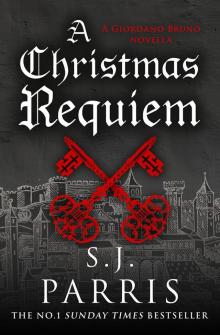 A Christmas Requiem
A Christmas Requiem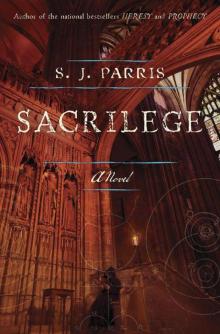 Giordano Bruno 03 - Sacrilege
Giordano Bruno 03 - Sacrilege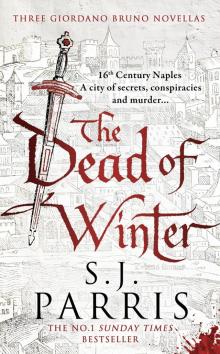 The Dead of Winter: Three gripping Tudor historical crime thriller novellas from a No. 1 Sunday Times bestselling fiction author
The Dead of Winter: Three gripping Tudor historical crime thriller novellas from a No. 1 Sunday Times bestselling fiction author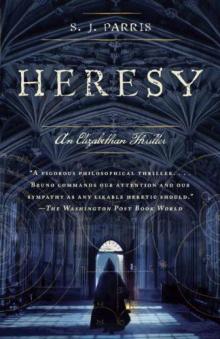 Giordano Bruno 01 - Heresy
Giordano Bruno 01 - Heresy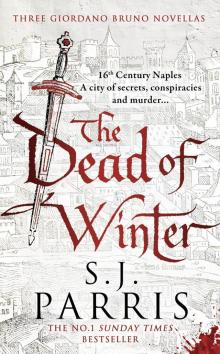 The Dead of Winter
The Dead of Winter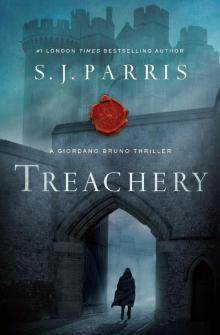 Treachery (2019 Edition)
Treachery (2019 Edition)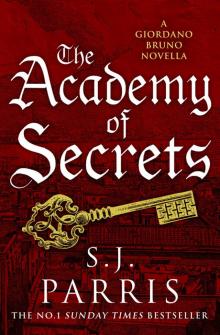 The Academy of Secrets
The Academy of Secrets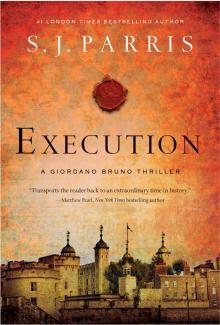 Execution
Execution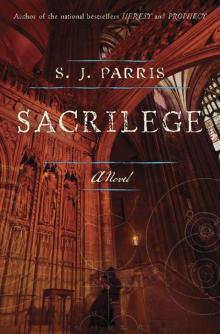 Sacrilege: A Novel
Sacrilege: A Novel Prophecy
Prophecy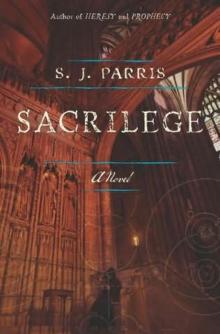 Sacrilege gb-3
Sacrilege gb-3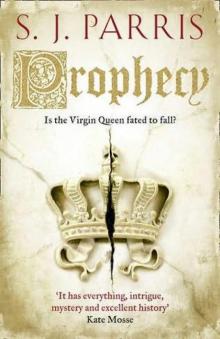 Prophecy (2011)
Prophecy (2011)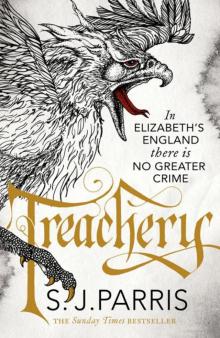 Treachery
Treachery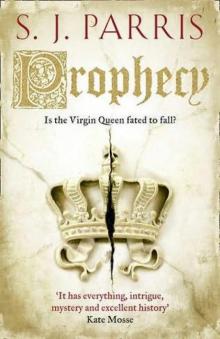 Prophecy gb-2
Prophecy gb-2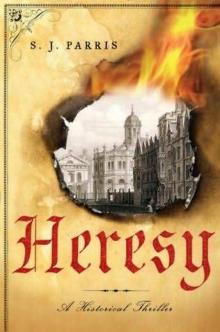 Heresy
Heresy